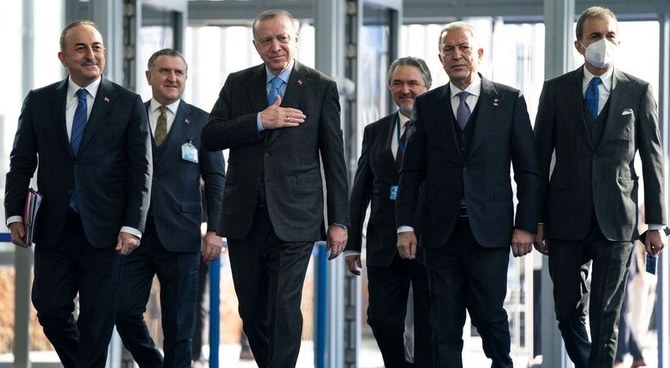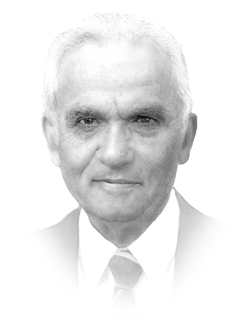Will Turkey weigh on NATO’s new defense architecture?

Turkey bid high in recently announcing that it would not approve applications by Sweden and Finland to join the NATO military alliance.
On his way back from a visit to Azerbaijan, Turkish President Recep Tayyip Erdogan said: “As long as Tayyip Erdogan is at the head of the Republic of Turkey we cannot say ‘yes’ to countries that support terror joining NATO.”
Following Russia’s invasion of Ukraine, the two Nordic countries expressed their wishes to apply for membership of NATO on the grounds of national security.
NATO member Turkey has threatened to veto the joining bids, citing the failure of Stockholm and Helsinki to respond positively to extradition requests for people Ankara said were linked to Kurdish groups it considered terrorist organizations.
Turkey also raised objections to what it claimed was the hosting of Kurdish militant groups by the two nations and Swedish arms sanctions on Ankara relating to its military operations in Syria.
The Turkish media has suggested that Ankara should capitalize on the latest NATO membership situation following previous missed opportunities involving Greece and France.
In 1974, when the Greeks withdrew from NATO military command due to Turkey’s military operations in Cyprus, the US used its leverage to persuade Ankara to refrain from vetoing Greece’s return, a move the Turks have since regretted.
The Supreme Allied Commander of NATO in Europe, Gen. Bernard Rogers, had promised to help resolve the contentious issue of the delineation of command and control of the Aegean Sea and the airspace over it, but Greece refused to participate in talks.
On a separate issue, after the breakup of Yugoslavia in the early 1990s, Greece opposed the use of the name Macedonia for the new independent country, and instead proposed that it be called the Former Yugoslav Republic of Macedonia. Ten years of negotiations followed, during which Athens vetoed Macedonia’s accession to the EU until the latter agreed to change its name to North Macedonia.
Turkey now feels its reasons for objecting to Sweden and Finland joining NATO are far more substantive and justified than Greece’s Macedonian concerns.
Turkey missed a similar veto opportunity when France wanted to return to the military wing of NATO.
In the late 1960s, then French President Charles de Gaulle fell out with the US over its domination of NATO and withdrew his country from the organization’s integrated military command structure. When France decided to return to the fold in 2009, Turkey again kept silent, even though the French strongly opposed Turkish EU membership. The Turkish government now regrets not having negotiated a deal with France in exchange for Paris withdrawing its opposition to Ankara’s joining the EU.
Now, however, Erdogan is standing firm, and is demanding written guarantees that Sweden and, to a lesser degree, Finland cut their support for the Kurdistan Workers’ Party.
But by announcing that it may carry out new military operations in Syria, Ankara has added a complicating factor to the equation. Such a move would coincide with Russia’s already having started pulling some of its troops out of Syria, with Iranian forces replacing them in certain areas. This has implications for Israel, whose defense forces have mainly been focusing their attacks on Iranian targets operating on Syrian soil.
Sweden and Finland have to understand Turkey’s sensitivities while Ankara must take on board their constraints; otherwise all sides will lose out.
Yasar Yakis
NATO countries will be keen to persuade Turkey to change its mind over its stance on Sweden and Finland. If worse comes to worst, the organization may find ways to isolate Ankara within the alliance by holding meetings in private, not inviting it to attend talks, and debating issues in its absence.
Devlet Bahceli, chairman of Turkey’s far right Nationalist Movement Party — the unofficial coalition partner of the ruling Justice and Development Party — said: “Turkey is not without options. Even leaving NATO should be put on the agenda as an alternative if the circumstances become inextricable. We did not exist because of NATO; we will not perish without NATO.”
The prospect of the withdrawal from NATO of a country the size of Turkey, especially considering its strategic geographical location, would have serious consequences for the alliance, particularly during a period when the defense architecture of Europe will be taking on a new shape.
Although Moscow would be pleased to see Ankara leave NATO, neither Turkey nor NATO should consider it seriously.
In light of these parameters, the best solution would be to solve the issue through negotiation. Sweden and Finland have to try and understand Turkey’s sensitivities while Ankara must take on board their constraints; otherwise all sides will lose out.
- Yasar Yakis is a former foreign minister of Turkey and founding member of the ruling AKP. Twitter: @yakis_yasar
Disclaimer: Views expressed by writers in this section are their own and do not necessarily reflect Arab News’ point of view
